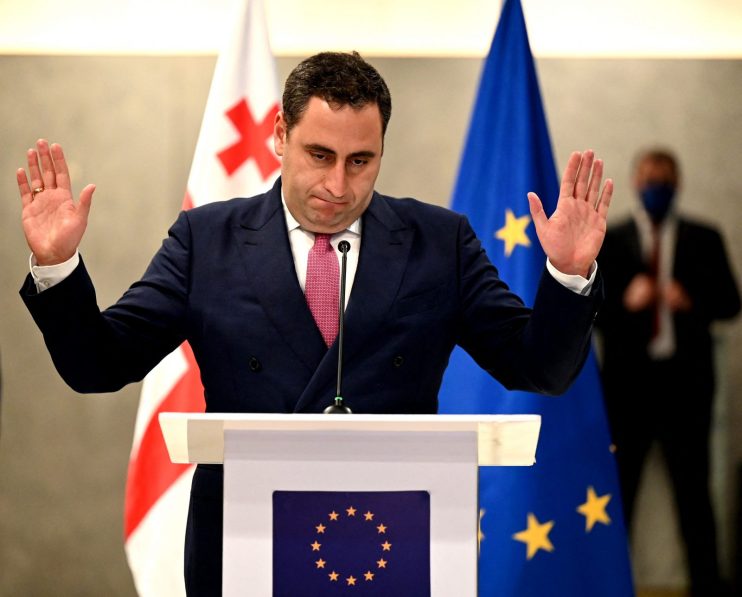Georgia was the post-Soviet beacon of hope for democracy but political turmoil could unravel it all

Georgia, for so long a beacon of hope for democracy and the rule of law in the post-Soviet world, is now once more mired in a political crisis. It is a tragedy for Georgia, where polling by the Washington-based National Democratic Institute (NDI) shows that the overwhelming majority of people want their country to be aligned more closely with the West, and a challenge for the European Union and the United Kingdom, both of which which have a long standing interest in and commitment to Georgia’s programme of reform.
Last month, police detained the main opposition leader, Nika Melia, using tear gas to force their way into the building where he had taken refuge. Astonishingly, Prime Minister Giorgi Gakharia, confirmed in office barely two months earlier, resigned in protest, criticising his government – by implication admitting that he hadn’t really been in charge of his own administration and that political motives lay behind Melia’s arrest.
Transparency International, the global anti-corruption movement, denounced the erosion of the rule of law, the lack of judicial independence and the influence of the ruling Georgian Dream party over the courts, prosecutors and police, something which, they argued, was being “weaponised to target political opponents”. It all added up, in their words, to “serious democratic backsliding” and a culture in which “impunity seems increasingly the norm for high-level corruption”.
Politics in Georgia is bitterly polarised, with elected opposition MPs boycotting Parliament amid allegations of malpractice during last October’s general election.
Fear that the courts are subject to political influence and arbitrary actions by the Georgian government are also putting at risk inward investment that is desperately needed in a country where roughly a quarter of adults say they are unemployed and NDI’s polling reports the top three priorities for voters as jobs, inflation and poverty.
Two strategic infrastructure projects have been aborted on what seemed pretty murky grounds. First, early in 2020 the Georgian government cancelled its contract for the construction of a deep-sea port at Anaklia, despite a consortium of international investors having been formed to raise the funds required. Georgia, despite 190 miles of Black Sea coastline, has no deep-sea port. Anaklia would have enabled it to compete with Russian ports for trade with the Middle East, Central Asia, India and China.
Then, last autumn, the Georgian government railroaded emergency legislation through parliament to give the state regulator power to appoint “special managers” to any telecoms or communications company, with power to hire and fire employees and to freeze out existing directors.
In one case, over a dispute with internet company Caucasus Online, those powers were used to effectively take control over the foreign-owned company, seizing its assets, preventing the repayment of its debts to Georgian banks, and depriving its shareholders of any right to challenge the government’s ruling. By freezing Caucasus Online, the Georgian government also successfully blocked the company’s “digital silk road” project – a new fibre-optic pipeline linking Asia and Europe across Georgia and Azerbaijan and under the Caspian and Black Seas, without the need to cross either Russian or Iranian territory.
Georgia matters to British interests, both economic and strategic, something recognised by the Johnson government when in 2019 it signed a Strategic Partnership and Cooperation Agreement with Georgia, the UK’s first with any eastern European country. Georgia has a formal partnership with NATO, has deployed more soldiers to the allied mission in Afghanistan than any other non-NATO member and has contributed to peacekeeping missions in Mali and the Central African Republic.
The United Kingdom is the biggest supplier of foreign direct investment into Georgia and just a few months ago boosted UK Export Finance there to £3 billion. Georgian territory provides a narrow corridor for a gas pipeline from Azerbaijan to Turkey and Europe, avoiding both Iran and Russia.
In its integrated defence and security review, published on 16 March, the British government renewed its commitment to focus efforts primarily on the Euro-Atlantic region and explicitly mentioned the Black Sea in that context.
The Review also committed the UK to “promote effective, transparent governance, robust democratic institutions and the rule of law” as part of being a force for good in the world.
Georgia is a country whose democratic transformation, in which such high hopes were placed, is now in trouble. Both United Kingdom interests and United Kingdom values are at stake. I hope that our government, working with allies in the United States and Europe, will use its diplomatic muscle and the UK’s long experience of helping young democracies to build and strengthen democratic institutions, independent courts and the rule of law to enable the people of Georgia to continue on the democratic path which they have chosen.